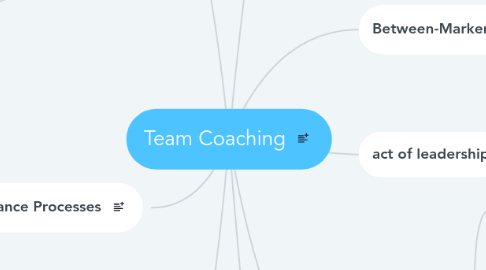
1. Functions
1.1. motivational
1.1.1. effort
1.1.2. minimize free riding or social loafing
1.1.3. build shared commitment
1.2. consultative
1.2.1. performance strategy
1.2.2. minimize mindless adoption or execution of task
1.2.2.1. in uncertain or changing task environments
1.2.3. foster invention of ways of proceeding with work
1.2.3.1. that are well aligned with task requirements
1.3. educational
1.3.1. knowledge and skill
1.3.2. minimize suboptimal weighting of members contributions
1.3.3. foster development of members' knowledge and skill
1.4. performance drives interpersonal processes
2. Performance Processes
2.1. level of effort
2.2. appropriateness of performance strategies
2.3. amount of knowledge and skill
3. Timing
3.1. Beginnings
3.1.1. members get oriented
3.1.1.1. to one another
3.1.1.2. to the task
3.1.2. in preparation for the start of actual work
3.1.3. motivational coaching interventions
3.2. Midpoints
3.2.1. team has logged some experience with task
3.2.2. team experienced an upheaval
3.2.2.1. driven by remaining time and amount accomplished
3.2.3. ongoing team also experience midpoints
3.2.4. strategy-focused coaching interventions
3.3. Ends
3.3.1. work is finished
3.3.2. significant task has been completed
3.3.3. team more likely to be ready to internalize learnings
3.3.4. time for reflection
3.3.5. educational coaching interventions
3.3.5.1. build team reservoir of talent
3.3.5.2. increase performance for subsequent tasks
3.3.5.3. contribute to personal learning
4. Conditions
4.1. key performance processes are not externally constrained
4.1.1. effort
4.1.1.1. work inputs under external control
4.1.2. strategy
4.1.2.1. performance operations externally determined
4.1.3. knowledge and skill
4.1.3.1. performance operations
4.1.3.1.1. simple
4.1.3.1.2. predictable
4.1.4. product development teams
4.1.4.1. pace decided by team
4.1.4.2. performance procedures mostly unprogrammed
4.1.4.3. complex skills required
4.1.4.4. considerable uncertainty
4.2. group is a well-designed performing unit
4.2.1. can negate the impact of coaching interventions
4.2.2. level of contextual support
4.2.3. effort
4.2.3.1. design of its task
4.2.3.2. reward system
4.2.4. performance strategy
4.2.4.1. core norms of conduct
4.2.4.2. organizational information system
4.2.5. knowledge and skill
4.2.5.1. composition of the team
4.2.5.2. organizational education system
5. Between-Marker Coaching
5.1. minimize tacit coordination
5.1.1. help members coordinate their activities
5.2. operant techniques
5.2.1. reinforce constructive rare team behaviours
5.2.1.1. verbal feedback
5.2.2. increase frequency of desirable behaviours
5.2.3. decrease frequency of undesirable behaviours
5.3. multiple task cycles teams
5.3.1. multiple beginnings, midpoints and ends
6. act of leadership
7. work team
7.1. full fledged teams that perform tasks in social system context
7.2. real groups
7.2.1. intact social systems
7.2.2. complete with boundaries
7.2.3. interdependence among members
7.2.4. differentiated member roles
7.3. members have group tasks
7.3.1. produce output
7.3.2. colective responsibility
7.3.3. acceptability is potentially assessable
7.4. social system context
7.4.1. team manages relationships with other individuals or groups in some larger social system
8. Team Performance Effectiveness
8.1. the productive output of the team
8.1.1. meets or exceeds client standards
8.1.2. quantity, quality and timeliness of client
8.2. the social processes the team uses
8.2.1. enhance members' capability
8.2.1.1. of working independently
8.2.2. help team
8.2.2.1. detect and correct errors before serious damage is done
8.2.2.2. notice and exploit emerging opportunities
8.3. the group experience
8.3.1. contributes positively to the learning and personal being of members
8.3.2. teams serve as sites for personal learning
8.3.3. net impact of the group experience on members learning and well-being is positive
